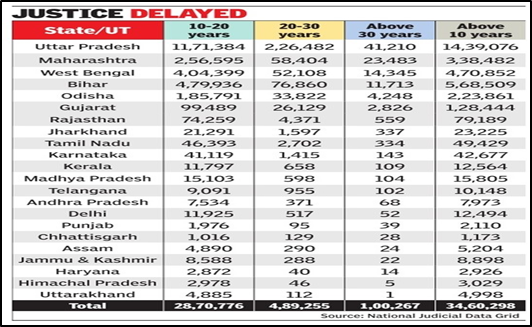In News:
- While over 1 lakh cases have been pending in India's lower courts for over 30 years, nearly 5 lakh cases have been pending for 20 to 30 years, and another 28. 7 lakhs have been pending for 10 to 20 years.
- According to an analysis of data from the National Judicial Data Grid, this brings the total number of cases pending for more than a decade to 34.6 lakh.
What’s in today’s article:
- About the National Judicial Data Grid
- News Summary
National Judicial Data Grid (NJDG):
- About:
- A part of the on-going e-Courts Integrated Mission Mode Project, NJDG is a flagship project launched in 2015 and is implemented under the aegis of the e-Committee Supreme Court of India.
- The e-Courts Mission Mode Project is a national e-Governance project (of the Department of Justice, Ministry of Law and Justice) for Information and Communication Technology (ICT) enablement of district and subordinate courts of the country.
- The objective of the project is to provide designated services to litigants, lawyers and the judiciary through ICT enablement of courts, thus improving access to justice using technology.
- The Project was conceptualized based on ‘The National Policy and Action Plan for Implementation of ICT in the Indian Judiciary - 2005’ of the e-Committee of the Supreme Court of India.
- The Cabinet Committee on Economic Affairs (CCEA) approved the project in 2007, expanded its coverage in 2010 and extended the project's duration in 2014.
- NJDG is a system for monitoring pendency and disposal of the cases in High Courts and Subordinate Courts.
- NJDG provides a comprehensive database of orders, judgements and case details of District and Subordinate Courts and High Courts.
- The statistics of pendency at National, State, District and at Individual Court level is available to anyone visiting the National Judicial Data Grid portal.
- Features:
- NJDG provides the consolidated figures of pendency of cases in Judiciary.
- Statistical data is automatically updated daily.
- Pending Civil and Criminal Cases segregated into varied categories.
- Information pertaining to Institution and Disposal of cases is shown.
- Serves as National Judicial Data Warehouse.
- Benefits:
- Works as a monitoring tool to identify, manage and reduce pendency of cases.
- Helps to provide timely inputs for making policy decisions to reduce delays in disposal of cases.
- Facilitates better monitoring of court performance and thus, serves as an efficient resource management tool.
- Promotes transparency and accountability in the system by displaying complete pendency and disposal of cases across the country in the public domain.
- NJDG has been instrumental for judicial planning, monitoring and remote administration by High Court judges, District Judges, and High Court Registry.
- NJDG is acknowledged as an innovation under the Ease of Doing Business initiative of the Government of India.
News Summary:










